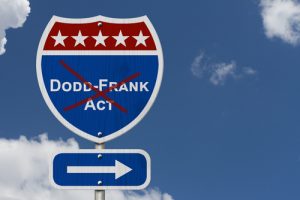
U.S. Rep. Jeb Hensarling (R-TX) introduced legislation that is intended to be an alternative to the Dodd-Frank Wall Street Reform and Consumer Protection Act, which was signed into law in 2010.
The Financial Creating Hope and Opportunity for Investors, Consumers and Entrepreneurs (CHOICE) Act would establish a new chapter of bankruptcy for complex financial institutions, enhance penalties for financial fraud and transparency in the civil enforcement process, and increase maximum criminal fines for individuals and firms that engage in insider trading and other corrupt practices.
“The Financial CHOICE Act guarantees that the era of big bank bailouts and ‘too big to fail’ is over,” Hensarling, the chairman of the House Financial Services Committee, said. “For banks that fail, there will be bankruptcy, not bailouts. In order to qualify for much-needed regulatory relief, financial institutions will have to be so well-capitalized that they pose no threat to hardworking taxpayers or to our economy.”
The Financial CHOICE Act, H.R. 10, would retroactively repeal the Financial Stability Oversight Council’s (FSOC) authority to deem firms systematically important financial institutions (SIFIs), and it would strike FSOC’s ability to deem certain payments and clearing organizations systemically important financial market utilities (FMUs) with access to the Federal Reserve discount window.
“Our plan lifts bureaucratic red tape intended for big banks on Wall Street off of community banks and credit unions on main street,” Hensarling said. “It expands access to capital for small businesses and innovative companies so that they can grow and create jobs. This will foster economic growth for all Americans, not just those at the top.”
The measure would also subject all financial regulatory agencies to constraints of the Regulations from the Executive in Need of Scrutiny (REINS) Act, and to the congressional appropriations process. Additionally, financial regulators would be required to conduct cost-benefit analyses of all proposed and final regulations.
“The Financial CHOICE Act also brings greater accountability to both Wall Street and Washington,” Hensarling said. “It imposes the toughest penalties in history for those who commit financial fraud, deception and insider trading, and it provides much-needed oversight and accountability to Washington bureaucrats’ regulatory overreach that imposes immense costs to job creation and the economy.”
U.S. Rep. Andy Barr (R-KY), an original cosponsor of the bill and a member of the House Financial Services Committee, said H.R. 10 would “undo the damage” of the Dodd-Frank Act by giving more Americans opportunities to succeed by cutting red tape, holding Wall Street accountable, ending bailouts and imposing tougher penalties for financial fraud.
“I applaud Chairman Jeb Hensarling for introducing this needed legislation and I look forward to working with him and my colleagues on the Financial Services Committee to deliver relief to small community financial institutions and their customers in Kentucky,” Barr said.
U.S. Rep. French Hill (R-AR) said the measure would lead to a “healthier, safer and stronger banking industry” by abandoning the one-size-fits-all approach of the Dodd-Frank Act.
“These relationship-driven, locally focused banks historically have played a primary role in providing loans and access to capital to many consumers and small businesses,” Hill said.
“The CHOICE Act will create an environment where our smaller financial institutions can fulfill their important role in bolstering economic growth. The bill also will end ‘too big to fail’ and the potential for future taxpayer-funded bank bailouts. Dodd-Frank institutionalized ‘too big to fail’ by enabling unelected bureaucrats in Washington to decide what constitutes ‘systemically important.’ The CHOICE Act will allow these institutions to fail without disrupting the economy or leaving the taxpayers on the hook,” he said.
Hill also was supportive of the aspects of the legislation that holds bad actors more accountable by increasing penalties for financial fraud and self-dealing.



